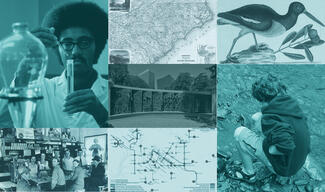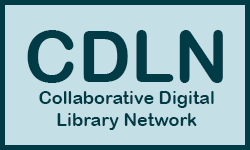About this site
About the CDLN Project Testbed
Collaborative Experiments in Shared Cyber infrastructure for Digital Scholarship and Libraries

About the CDLN Project Testbed
Funded by a grant from the Institute of Museum and Library Services, the CDLN Project Testbed is a platform for faculty, librarians, and students to experiment with shared approaches to cyberinfrastructure for research in cultural memory and humanistic inquiry. If you are interested in participating in the project, please contact us, as we welcome additional collaborators, experimenters, and those with a sense of curiosity about the new possibilities of digital scholarship.
This project builds on the findings of other innovative alliances which have been successful in fostering experimentation and development of new shared tools for digital scholarship, content offerings, and services, especially among collaborating academic libraries. Smaller institutions within such alliances especially benefit by gaining access to otherwise unaffordable infrastructures and expertise. Leveraging access to more robust infrastructures and support services have become progressively more important for academic libraries as faculty and students increasingly seek assistance in utilizing digital scholarship in their research efforts. (Mulligan, 2016) (Note: References are detailed at the bottom of this page.)
Technological changes over the past three decades have radically changed the services which libraries can provide to their clientele in transformational ways. The pace and rate of change has meant that it is difficult for individual libraries, especially small libraries, to fully embrace or even experiment with the range of new opportunities that arise. Coalitions of libraries are better able to grapple with this changing landscape. The aims of this project in exploring this broad issue of national importance have been informed by a combination of successful previous collaborative results, current needs analysis activities, and a literature review of similar cooperative library efforts.
The recent IMLS report (Rudersdorf et al., 2018) on progress in advancing the national digital infrastructure discusses these issues and opportunities at length, stating “…radically diverse collaborations are offering opportunities for greater access to new tools and innovation, breaking down information silos, and building ethical partnership models.” (p. 14) This highlights the need for practical research concerning effective strategies for forming and sustaining new digital library (DL) communities of mixed organizational types. The need for practical research in this area has been a topic of study for at least the past decade. (Skinner and Halbert, 2008)
National Challenges and Opportunities Addressed by this Project: The question of how to scale up cyberinfrastructures to facilitate innovative new digital scholarship capabilities has been a priority for collaborative inquiry for almost a quarter of a century. (Lynch and Garcia-Molina, 1995) There have been instances of large digital library networks that have been notable in leading national innovations among collaborating libraries in provision of access to digital content, collections, and services to a wide range of users.
Engaging Students and Underserved Communities: The project team is explicitly seeking to engage underserved communities and students through digital scholarship activities. We hope to evaluate how digitization workflows can empower young scholars and the underserved to better preserve their historical documents, and be made more visible and accessible for scholarly study.
2022 Symposium: We plan to hold a symposium in early summer 2022 which will include presentations by participants on the topic of developing digital scholarship and library services, successful practices in collaborative community formation, and strategic consensus building. We will invite several nationally recognized speakers to give core presentations on these topics, and will also provide multiple informal opportunities for attendees to participate in panels to share information from their projects.
References:
Lynch, C., and Garcia-Molina, H. (1995) “Interoperability, Scaling, and the Digital Libraries Research Agenda” Report on the May 18-19, 1995 IITA Digital Libraries Workshop. Information Infrastructure Technology and Applications (IITA) Working Group in Reston, Virginia on May 18-19, 1995. URL: https://www.nitrd.gov/PUBS/iita-dlw/IITA_Digital_Libraries_Workshop.pdf
Mulligan, R. (2016) Supporting Digital Scholarship. SPEC Kit 350. Washington, DC: Association of Research Libraries, May 2016. URL: https://publications.arl.org/Supporting-Digital-Scholarship-SPEC-Kit-350/
Rudersdorf, A. et al. (2018). National Digital Infrastructure and Initiatives: A Report on the 2017 National Digital Platform at Three Forum. Washington, D.C.: Institute of Museum and Library Services, Office of Library Services.
Skinner, K., and Halbert, M. (ed.) (2008) Strategies for Sustaining Digital Libraries. Atlanta, GA: Emory University DL Pubs.
